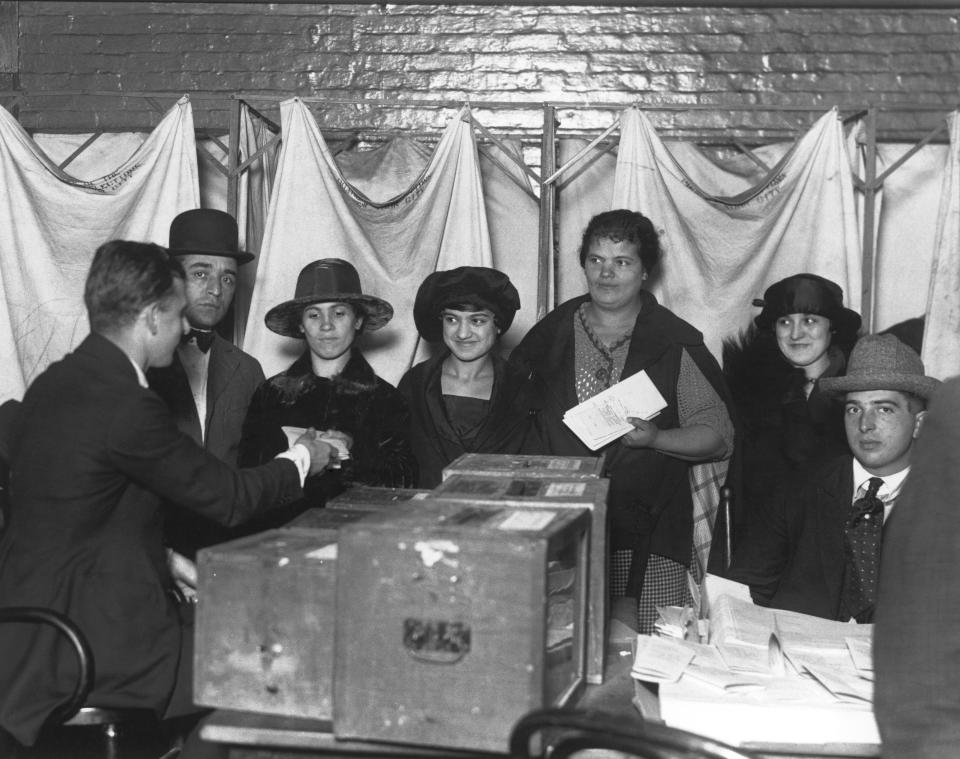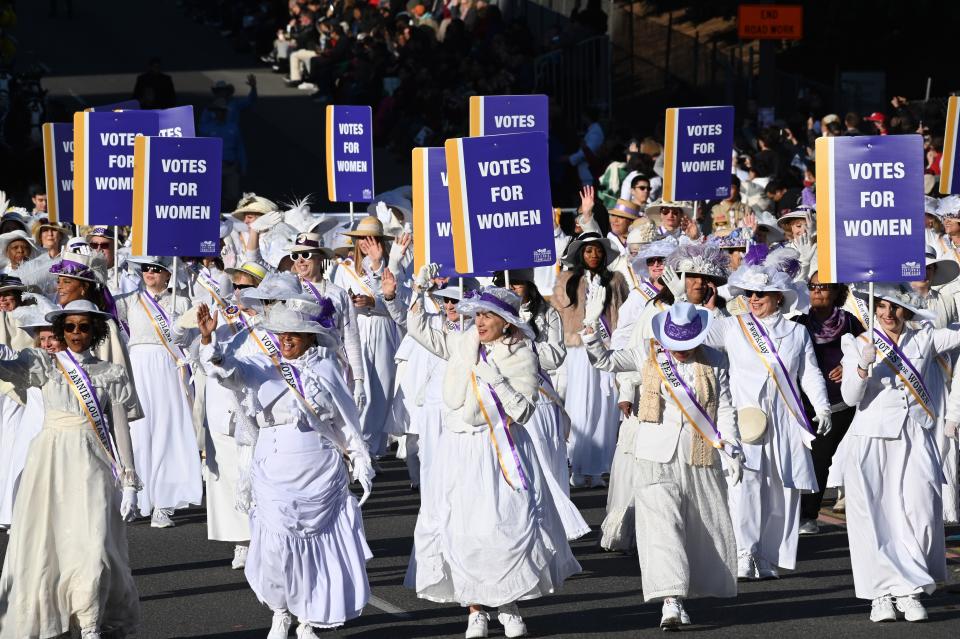How the 19th Amendment shaped women's rights

This is part of an occasional series of Yahoo News articles and accompanying videos on how the issues America faced in the 1920s — aka “the Roaring ’20s” — have echoes in our own decade, a century later.
Tuesday marks the 100th anniversary of the ratification of the 19th Amendment — a landmark piece of legislation mandating that citizens’ right to vote “shall not be denied or abridged by the United States or by any State on account of sex.”
The gravity of the amendment has not been forgotten, though it would take decades more for voter protections to be extended to Black women and others. A recent Pew Research Center survey found that 49 percent of Americans say women gaining the right to vote has been the most important milestone in advancing the position of women in the U.S. — more than the passage of the Equal Pay Act or the Family and Medical Leave Act, or the availability of the birth control pill.
And while this year’s presidential election will likely look very different from the 1920 contest — or any other presidential election — with masks worn in many polling stations and mail-in voting becoming a new normal, the coronavirus pandemic isn’t stopping women from exercising the hard-fought right to vote. According to a May poll from the nonpartisan organization All in Together, 82 percent of women said they will almost certainly vote in the 2020 election, and even women who have been deeply burdened by the COVID-19 crisis said they still view their vote as important, and are more inclined “to take actions connected to the election.”

The passage of the 19th Amendment was decades in the making. First introduced to Congress in 1878, it would be more than 40 years before the bill became law. In the absence of a federal mandate, some states (mostly in the West) took voting rights into their own hands and began passing statewide women’s suffrage. Nineteen states or territories granted women the right to vote before ratification of the 19th Amendment in 1920, but in many cases it was limited, such as allowing women to vote only in presidential elections.
The suffrage campaign was slowed by the U.S.’s 1917 entry into World War I. But the war may have ultimately helped advance the cause; women’s contributions during the war, activists argued, proved that they deserved full citizenship rights.
And on June 4, 1919, Congress passed the 19th Amendment and sent it to the states for ratification, where it needed a two-thirds majority to become law. Wisconsin, Illinois and Michigan became the first states to ratify the amendment, and on Aug. 18, 1920, Tennessee became the 36th and final state needed to pass it. The amendment was officially adopted into the Constitution on Aug. 26 — a date that’s now memorialized as Women’s Equality Day.

Yet some scholars have claimed that in the years immediately following the passage of the 19th Amendment, female voter turnout was abysmal. Popular magazines at the time published defeatist headlines, such as “Is Women’s Suffrage a Failure?” in Good Housekeeping in 1924.
J. Kevin Corder and Christina Wolbrecht, the authors of “Counting Women’s Ballots: Female Voters From Suffrage Through the New Deal,” have pointed out that unlike today, when records, exit polls and public surveys provide detailed information on how women and other demographics vote, those tools didn’t exist in the 1920s. But the authors also observed that while it appears true that women had lower turnouts than men in the years after the 19th Amendment was passed, such assessments fail to take into account the obstacles that newly enfranchised voters faced, such as the stereotype that questioned whether women should participate in politics. And, the authors noted, poll taxes, literacy tests and other obstructive devices that were implemented by states to heavily oppress African-American voters also affected some poor white female voters.
These acts of voter suppression highlight the ugly truth of the suffrage movement — that ultimately, Black women in the U.S. wouldn’t fully benefit from the 19th Amendment. It would be more than four decades until the Voting Rights Act in 1965. The 19th Amendment was by no means the final step in women’s equality, nor did it have the same level of impact for all women.

African-American women are now among the most active voters. Turnout among eligible Black women in the 2018 midterms was 57 percent, according to the Center for American Progress — one of the highest rates in the country. And women as a whole have not only caught up with men in the voting booth since the 1920s, they’ve surpassed them, voting in higher numbers than men in every presidential election since 1964, according to the Rutgers Center for American Women and Politics.
In the past 100 years, the voting habits of women have also changed. Women in the U.S. — and worldwide, particularly in Western countries — are more likely to vote for left-leaning candidates than men are. Bloomberg notes that this “gender gap” is relatively new to voting, with research showing that men and women generally voted similarly in the early 20th century, diverging in the 1960s and 1970s as more women joined the workforce and began putting off marriage.
This voting trend is already playing out in this election cycle — the Brookings Institution says the 2020 election “is being driven by the increasingly overwhelming determination of a significant number of women from every demographic to vote Democratic at every level of the ballot regardless of the gender of the candidate.” A Quinnipiac poll last month found that 59 percent of women planned to vote for presumptive Democratic nominee Joe Biden, compared with 31 percent who planned to vote for President Trump.
Yet when it comes to giving women equal rights with men, a majority of adults — 57 percent — think the U.S. hasn’t gone far enough, according to the Pew Research Center. They point to sexual harassment, societal expectations and not enough women in positions of power as obstacles that women still need to overcome 100 years after the passage of the 19th Amendment.

This month Yahoo celebrates the 100th anniversary of the ratification of the 19th amendment to the U.S. Constitution. This landmark passage gave American women the right to vote and an opportunity to help shape the laws and policies of their country. Check Yahoo’s new series of stories all month featuring profiles on past and present champions of women’s voting rights.
_____
Read more from Yahoo News:
